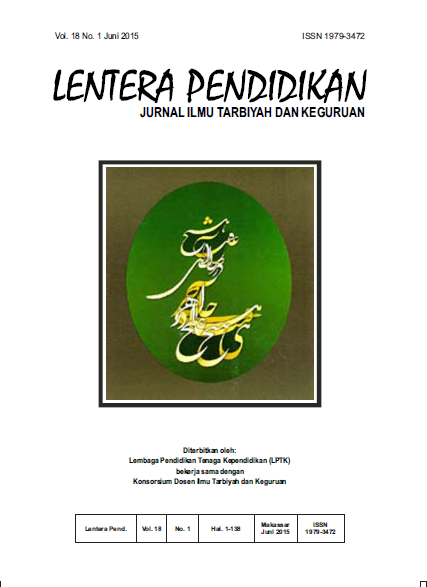KONSEP PENDIDIKAN MORAL MENURUT AL-GAZALI DAN ÉMILE DURKHEIM
Abstract
Abstract: The development of science and technology has brought about many changes in society life. However, the main concern here is that the changes have caused the existence of moral crisis. This is based on the fact that the development of knowledge in the area of technology and information is not balanced with the development of moral of modern society. The reality of life that drives educational activity continuously to run and change that demand the new acceleration in educational world, especially moral education. Therefore, the concept of moral education still needs to be specifically examined because the concept of moral education is very important in educational world. Moral education is not a new problem. There are many experts that have formulated the concept of education and have taken moral as not a separated part of educational system. Even, moral education has to integrate the spiritual and intelectual aspects and also normatif and hystorical aspects (reality). The integration of all these aspects will become the core for the balance between the aspects of cognitive (mind), affective (faith), and pychomotoric (deed) in education practices.
Abstrak: Perkembangan sains dan teknologi telah banyak memberi perubahan dalam kehidupan masyarakat. Tetapi, yang memprihatinkan adalah perubahan itu justru mendorong munculnya krisis moral. Hal ini didasarkan pada kenyataan bahwa kemajuan ilmu pengetahuan di bidang teknologi dan informasi tidak selalu sebanding dengan kemajuan di bidang moral pada masyarakat modern. Realitas kehidupan yang menggiring aktivitas pendidikan terus berjalan dan berubah-ubah menuntut adanya suatu akselerasi baru dalam dunia pendidikan terkhusus pendidikan moral. Oleh karena itu, konsep pendidikan moral masih perlu dikaji secara spesifik karena konsep pendidikan moral adalah hal yang sangat penting dalam dunia pendidikan. Pendidikan moral memang bukanlah persoalan baru. Banyak ahli pendidikan telah merumuskan konsep pendidikan dan menjadikan moral sebagai bagian yang tidak terpisahkan dari sistem pendidikan. Bahkan pendidikan moral harus mampu mengintegrasikan aspek-aspek spiritual dan intelektual serta aspek normativitas dan historitas (realitas). Integrasi keseluru-han aspek tersebut akan menjadi inti bagi keseimbangan aspek kognitif, (akal), afektif (iman), dan psikomotorik (amal) dalam pendidikan secara praktis.
Downloads
References
Abdullah, Amin. Filsafat Etika Islam: Antara Al-Gazali dan Kant. Cet. II; Bandung: Mizan, 2002.
Abu Daud, Sulaiman bin al-Asy‘asy al-Sajastani al-Azdi. Sunan Abi Daud, Kitab al-Aqdiyah fi al-Sulh Bab Ijtihad al-Ra’yi fi al-Qada’. Jilid II, Beirut: Dar al-Fikr, 1994.
Durkheim, Émile. Moral Education terj. Lukas Ginting, Pendidikan Moral. Jakarta: Erlangga, 1990.
AL-Gazali, Zainuddin Abu Hamid Muhammad bin Muhammad al-Tusi. Ihya’ ‘Ulum al-Din. Jilid IV, Kairo: al-Sya‘b, t.th.
Hasan, Muhammad Tholhah. Prospek Islam dalam Menghadapi Tantangan Masyarakat. Cet. VI; Jakarta: Lantabora Press, 2005.
Lacyendecker, L. Tata, Perubahan, dan Ketimpangan Sosial: Suatu Pengantar Sejarah Sosial. Cet. II; Jakarta: Gramedia Pustaka Utama, 1983.
Muhni, Djuretna A. Imam. Moral & Religi: Menurut Émile Durkheim dan Hendri Bergson Cet. I; Yogyakarta: Kanisius, 1994.
Ritzer, George & Douglas J. Goodman. Sociological Theory. Mcgraw-Hill: New York, 2004.
Siraj, Fuad Mahbub. Al-Gazali Pembela Sejati Kemurnian Islam. Cet. I; Jakarta: Dian Rakyat, 2012.
Authors who publish with this journal agree to the following terms:
1) Authors retain copyright and grant the journal right of first publication with the work simultaneously licensed under a Creative Commons Attribution License that allows others to share the work with an acknowledgement of the work's authorship and initial publication in this journal.
2) Authors are able to enter into separate, additional contractual arrangements for the non-exclusive distribution of the journal's published version of the work (e.g., post it to an institutional repository or publish it in a book), with an acknowledgement of its initial publication in this journal.
3)Authors are permitted and encouraged to post their work online (e.g., in institutional repositories or on their website) prior to and during the submission process, as it can lead to productive exchanges, as well as earlier and greater citation of published work (See The Effect of Open Access).

